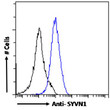| Post Translational Modifications | Not N-glycosylated. Auto-ubiquitinated. |
| Function | E3 ubiquitin-protein ligase which accepts ubiquitin specifically from endoplasmic reticulum-associated UBC7 E2 ligase and transfers it to substrates, promoting their degradation. Component of the endoplasmic reticulum quality control (ERQC) system also called ER-associated degradation (ERAD) involved in ubiquitin-dependent degradation of misfolded endoplasmic reticulum proteins. Also promotes the degradation of normal but naturally short-lived proteins such as SGK. Protects cells from ER stress-induced apoptosis. Protects neurons from apoptosis induced by polyglutamine-expanded huntingtin (HTT) or unfolded GPR37 by promoting their degradation. Sequesters p53/TP53 in the cytoplasm and promotes its degradation, thereby negatively regulating its biological function in transcription, cell cycle regulation and apoptosis. Mediates the ubiquitination and subsequent degradation of cytoplasmic NFE2L1. During the early stage of B cell development, required for degradation of the pre-B cell receptor (pre-BCR) complex, hence supporting further differentiation into mature B cells. |
| Protein Name | E3 Ubiquitin-Protein Ligase SynoviolinRing-Type E3 Ubiquitin Transferase SynoviolinSynovial Apoptosis Inhibitor 1 |
| Database Links | Reactome: R-HSA-381038Reactome: R-HSA-5358346Reactome: R-HSA-5362768Reactome: R-HSA-901032 |
| Cellular Localisation | Endoplasmic Reticulum MembraneMulti-Pass Membrane Protein |
| Alternative Antibody Names | Anti-E3 Ubiquitin-Protein Ligase Synoviolin antibodyAnti-Ring-Type E3 Ubiquitin Transferase Synoviolin antibodyAnti-Synovial Apoptosis Inhibitor 1 antibodyAnti-SYVN1 antibodyAnti-HRD1 antibodyAnti-KIAA1810 antibody |
Information sourced from Uniprot.org









